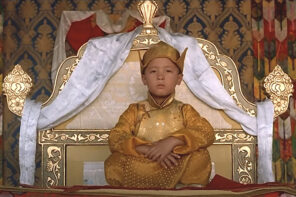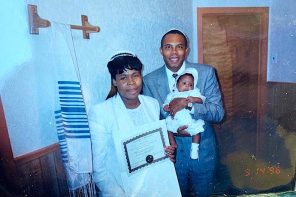Hair is a religion, especially if you’re a black woman. Yes, I know you purists won’t believe me, but when you are a black woman you can conceivably, depending on how much you worship hair, spend half your life in the beauty salon—and the rest in church.
My favorite philosopher of the comedy circuit, Chris Rock, has created a gem of a documentary called Good Hair, exploring the intricate ways in which black hair effects individuals, families, economics, social location, sexuality, and yes, even religion. Rarely have I seen a documentary that has made me laugh hysterically, want to cry, or become an activist—all at the same time.
The film scrutinizes black hair care: from the beauty salon to the hair show, and from chemical relaxers to the Indian hair that fuels the hair weave industry. Deftly using his daughters as a focus, Rock puts together a cogent argument for the ways in which hair has become just another type of slavery for black women. And I should know this, in ways that pain me to this day.
In order to write my book, Women in the Church of God in Christ: Making a Sanctified World, I had to wear my hair bone-straight in order for many of the women in the denomination to accept me. Had I come with the 1970s retro hairstyle I rock today, I doubt seriously if the book would have been finished. Hair acted as a marker in the Church of God in Christ (COGIC) from the very beginnings of the denomination: their holiness and purity codes in the early 20th century forbade the processing or pressing of hair (like Madam C.J. Walker’s revolutionary hair-straightening process.)
As the denomination grew in cities during the 1940s, straight hair became the currency of charismatic authority and power for the church mothers and pastors’ wives. Lighter skin, straighter hair, and European features became a precious commodity within a closed religious system; darker-skinned, kinky-haired women could look forward to becoming the head of the usher board, but never a vaunted evangelist or pastor’s wife. Although I would have loved to talk about this within the confines of my book, the pictures of bishops, their wives, and other pastoral couples left me both vexed and afraid. I didn’t want to risk offending people who had not figured out the politics of hair, even if they had deployed it almost as surely as sanctification had been used to cut the wheat from the chaff. Watching Good Hair brought up all of those memories, and more, from the research of my book.
The Marriage of Hinduism and Black Hair Care
Apart from being a good film, Good Hair has a religious subtext that is important to look at within the context of the study of religion. You see, most of the “weave hair” (if you don’t know what a weave is, hit the link—you’ll understand) comes from the practice of tonsure, or ritual haircutting, in Hinduism. The sacrifice of hair to the gods is the source of much of the human hair business in the United States. In fact, Rock’s documentary informs us that the hair cut for temple sacrifices is now the number-one export out of India. The fact that tonsure, a religious act, has turned into a profiteering scheme is remarkable. But there also exist unscrupulous people who are stealing women’s hair, either while they sleep or in movie theaters where their braids or hair hang over the seats; while a woman is enjoying the latest from Bollywood, someone is cutting her hair and exporting it to be sold in Los Angeles.
The marriage of Hinduism and black hair care is fascinating—and troubling. The fact that hair willingly sacrificed to the gods is then sold to American women (not only black women now, but anyone who wants a shock of human hair as enhancement) is disconcerting to say the least. To undergo tonsure in good faith only to have your hair turn up on a video vixen like Mellysa Ford is a little much.
I personally wonder what the reaction will be of the many Christian women watching this movie, realizing that the hair they paid for began its journey as a sacrifice to a Hindu god. Lest you think that this is not a serious question, the very same issue was raised a few years ago within Orthodox Jewish communities when one of the rabbis ruled that previously sacrificed human hair from India was not Kosher; the ensuing panic led Orthodox women to look to synthetics and other hair sources for their wigs.
Hair is not only about women. Another ubiquitous presence in African American religion—the preacher—shows up within the story in the figure of Al Sharpton, whom Rock calls “the Dalai Lama of relaxer.” Sharpton recalls how his trademark hairstyle began with James Brown’s request that he join him for a visit to the Reagan White House in order to lobby in favor of making Martin Luther King Jr.’s birthday a national holiday. Sharpton’s presence in the film acts as the “humph, humph” moment as he frets over the cost of hair care and the loss of black-owned businesses to the black community. It was, however, a bit difficult to concentrate on the gravity of Rev. Sharpton’s message after he was asked whether his wife allowed him to touch her hair, to which he admitted that the real question was whether she could touch his!
Finally, if you have never seen a “hair show,” you owe it to yourself to see the movie. Even a hair show can become a flash point for belief and behavior as we see finalist Tanya practice with her crew to vie for Top Stylist at the Bonner Bros. Hair Show in Atlanta. Tanya’s crew, helmed by a former winner whose faith in God to led them to victory, is framed in the many prayers and entreaties to the Lord to give them the win. The most interesting moment, however, comes when, after a fast is called for, one of Tanya’s team takes issue with it declaring that “she does not believe” in fasting. This moment of questioning a religious practice is issued in whispers, but it makes for a tense and interesting cinematic moment. Once more, the divine creeps into the politics of hair.
For the casual observer, Good Hair might be mistaken for a niche film aimed at an audience of African descent. Yet that would be a mistake. The aesthetic obsession with hair, perfect bodies, cosmetics, and the like is a spiritual pursuit—whether we like it or not. The lengths (no pun intended) people go to in order to have the hair that makes them desirable to others and to themselves is their prerogative. But the very pathos that has been induced by slavery, racism, and our American obsession with what constitutes beauty is painful to watch.
The unresolved pain, and the lack of attention to the history of why hair has become such an obsession for African American women in particular, is the only drawback to this otherwise insightful and entertaining movie. And FYI: all of the hair on my head is mine. It is not a weave. But please, ask me before just reaching out to touch it—or else you might lose your hand☺.




